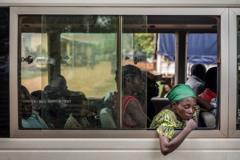In recent months, the US refugee landscape has sparked heated debates, particularly surrounding the preferential treatment granted to white South Africans, notably Afrikaners. Many refugees from diverse backgrounds voiced their outrage, claiming the policies disproportionately favor a select few while leaving countless others without hope during turbulent times.
One significant case involved Pacito, a refugee from the Democratic Republic of Congo (DRC), who found himself stranded in Kenya after the abrupt cancellation of his family's scheduled flight to the US a mere 24 hours before departure. “I didn’t have anywhere else to go,” he lamented, revealing the emotional turmoil and instability experienced by many who waited years for an opportunity to resettle. Pacito and his family now face ongoing struggles in Kenya, all while witnessing planes filled with Afrikaners landing with government support.
In a stark contrast to the influx of refugees previously seen under the Biden administration, the Trump administration's recent executive orders have signaled a shift back towards an isolationist approach. Restrictions on resettling refugees have left around 120,000 approved individuals in uncertainty. Critics of the current policies have pointed out that while some families face imminent threats, others are receiving expedited support based on claims of protection from unwarranted concerns about persecution.
Supporters of the expedited refugee pathway for Afrikaners argue they face significant persecution in South Africa, a claim that has garnered controversial opinions and substantial backlash. White South Africans represent only 7% of the population yet own a staggering 72% of farmland, drawing scrutiny to the targeted policies that have been interpreted as unjust by many in the international community.
“Every case of protection should be based on credible evidence of persecution,” remarked Timothy Young from the non-profit organization Global Refuge, emphasizing the necessity for fairness across all refugee cases. Critics are concerned that robust protections are not being granted to other groups who have faced serious threats in their own countries, such as those fleeing violence in Gaza or Afghanistan.
As the Hammad family, refugees from Gaza currently residing in Egypt, express their confusion over disparities in treatment, the overarching sentiment remains: the current refugee system's favoring of one group over another raises profound questions about fairness and equality. With resettlement options dwindling for many, individuals like Pacito feel left with no viable solutions, helpless amid rising turmoil in their native lands. The situation encapsulates a pressing humanitarian crisis as individuals await fair treatment and a resolution to their plight.


















